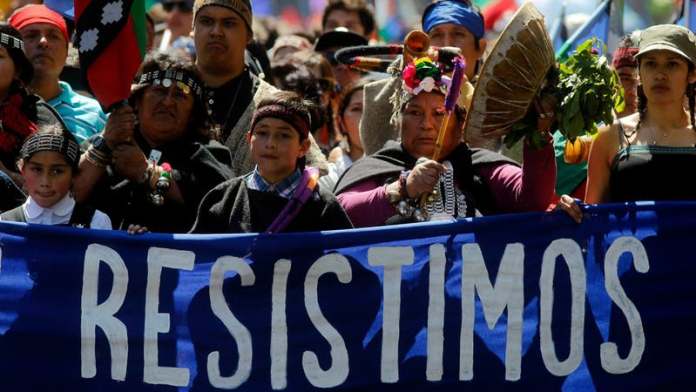There is a reality in Chile: the State has a historical debt with its native peoples. It is a fact that violence is installed and is triggered periodically in Araucanía, for the same reason, the explanation must be sought, the origin to be able to extinguish these events, install political agreements and find solutions.
Since the return to democracy, more than 16 Mapuche people have died, most of them at the hands of the police. A week ago, a new murder of a community member occurred, the government described it as a confrontation between the police forces and what it considers to be terrorist groups.
For 140 years the Mapuche community has been asking the State for vindication. However, they have never been paid attention, on the contrary, they have been treated as vulgar, extremists, and destructive groups of social peace, who must be crushed with weapons.
Violence and punitive practices against the indigenous people are not recent practices. Governments have done a job of moral demolition over the years, they have treated them as savage hordes that must be yoked, giving freedom and powers to the army to attack them, out of all legal proportion.
Is it justifiable to remove tracts of land that belonged to the Mapuche people, depriving them of almost 10 million hectares of original territory, in a violent and arbitrary manner?
In 1861, when the Mapuche communities were already settled in Araucanía, 15,000 settlers of different nationalities entered Chile. The Chilean army tyrannically occupied, divided, and handed over indigenous territories to settlers to produce.

The army did offensive work that consisted of wearing down the indigenous people, destroying their Lucas, burning plantations, stealing livestock. They arrested, kidnapped, mutilated, burned, and killed children and entire families.
These savage and violent incursions sought to destroy the integrity of the Mapuches in order to gradually occupy territories and, in addition, to appropriate livestock.
More than one hundred thousand indigenous people were reduced and expelled from their ancestral lands, ignoring all rights they had through parliament.
By 1934, in Lonquimay, thousands of Mapuches lived in crowded conditions, working strenuous hours, being repressed and abused (as in the nitrate works in the north of the country). Faced with the iniquities, the workers and the Mapuche peasantry rose up.
They were surrounded by the military and taken to Santiago, but not even half arrived, as a large part of them were tortured and killed on the way.
The then-president, Arturo Alessandri, did not condemn the actions of the Carabineros General responsible for the massacre, on the contrary, he put him in charge of the Santiago garrison.
Sometime later, the General led a new massacre, that of workers’ insurance, where around sixty Chilean students, surrendered, twenty meters from La Moneda, were riddled with bullets. All approved by the president.
This November 9, the President of the Republic, Sebastián Piñera, extended the State of Constitutional Emergency Exception for another 15 days in four provinces of the South Macrozone. This, as a result of the alleged confrontation that ended the life of the community member Yordan Llempi, in Cañete.
According to the president, the armed deployment was made to give Chileans peace and tranquility. No. The Armed Forces are prepared for war, not to install peace. The government pointed out that, in the middle of a public poll, more than 80% of citizens wanted to extend the State of Exception, what it did not say is that only 17% of the population voted.

The Constitution indicates that the state of emergency is decreed in the event of serious disturbance of public order or serious damage to the security of the Nation.
In 2013, during Piñera’s first term, the United Nations (UN) commissioned an exhaustive study of the human rights situation regarding the Mapuche people and territorial claims, particularly in the Bío Bío and Araucanía regions.
Ben Emmerson, an expert sent by the UN, pointed out that the authorities should avoid invoking Law 18,314 on anti-terrorism, created during the dictatorship in 1984 because the Mapuche community does not want to appropriate state power.
He pointed out that it is essential that a National Consultative Commission be established, with a broad representation of members of the Mapuche nation, to advance in matters such as the constitutional recognition of this and the other ethnic groups present in Chile, and the restitution of their lands.
The definition of a National Strategy is important to plan a participatory policy, in order to advance in the political, cultural, and practical recognition of the Mapuche nation.
It is the historical blindness of the Chilean State, rather, the lack of political will, due to the deep interest of foresters and companies that collides with the claim of territory. That is the real conflict.


















































































